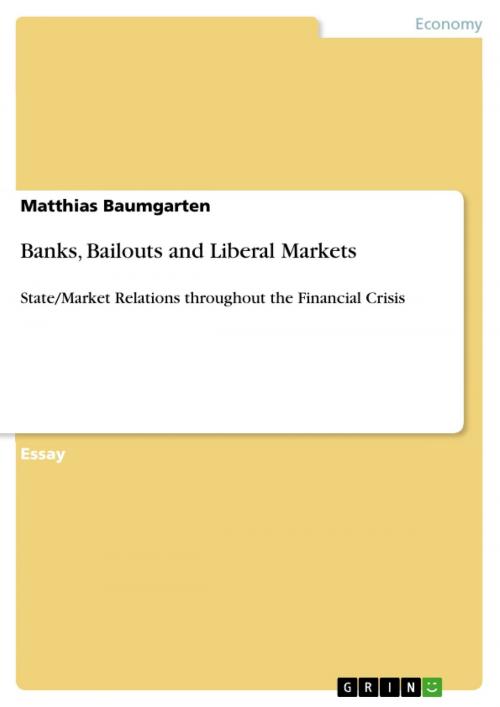Banks, Bailouts and Liberal Markets
State/Market Relations throughout the Financial Crisis
Business & Finance, Economics, International| Author: | Matthias Baumgarten | ISBN: | 9783656113591 |
| Publisher: | GRIN Verlag | Publication: | January 30, 2012 |
| Imprint: | GRIN Verlag | Language: | English |
| Author: | Matthias Baumgarten |
| ISBN: | 9783656113591 |
| Publisher: | GRIN Verlag |
| Publication: | January 30, 2012 |
| Imprint: | GRIN Verlag |
| Language: | English |
Essay from the year 2011 in the subject Economics - International Economic Relations, grade: 1,0 (78 %), University of Warwick (Politics and International Studies), course: International Political Economy, language: English, abstract: The power and instability of the financial system, fuelled by decades of deregulation and liberalization, have been demonstrated impressively by the current financial crisis. Some commentators see in this system a disembedding of society and markets, predicting a new Polanyian 'double movement' that returns power to the state. However, the idea of the 'powerless state' is not applicable, as states consciously embedded their citizens in the financial markets in order to shift social welfare responsibilities to individual asset-owners. This gave financial markets control over financial dynamics, which was used to create profits through innovation and disproportionate risk-taking. As a consequence, small changes in financial variables caused the international financial crisis, and governments felt compelled to bailout overleveraged financial institutions deemed 'too big to fail'. Hyman Minsky described many of these developments in his 'financial instability hypothesis'. As bailouts are only temporary measures to uphold the status quo, he calls for increased state control over the financial markets in order to prevent excessive speculation in the future. Many regulatory proposals created following the onset of the crisis echoed this demand, envisioning a paradigmatic shift that could reverse the trend of deregulation in pre-crisis years. However, the reliance of the state on the financial sector to support the system of 'asset-based welfare' proved to be resilient enough to withstand the initial crisis. Now, signs of recovery create new priorities that displace demands for financial regulation. The financial markets thus retain their central position, albeit with a few self-regulatory obligations, and a change in state/market relations is unlikely to occur.
Essay from the year 2011 in the subject Economics - International Economic Relations, grade: 1,0 (78 %), University of Warwick (Politics and International Studies), course: International Political Economy, language: English, abstract: The power and instability of the financial system, fuelled by decades of deregulation and liberalization, have been demonstrated impressively by the current financial crisis. Some commentators see in this system a disembedding of society and markets, predicting a new Polanyian 'double movement' that returns power to the state. However, the idea of the 'powerless state' is not applicable, as states consciously embedded their citizens in the financial markets in order to shift social welfare responsibilities to individual asset-owners. This gave financial markets control over financial dynamics, which was used to create profits through innovation and disproportionate risk-taking. As a consequence, small changes in financial variables caused the international financial crisis, and governments felt compelled to bailout overleveraged financial institutions deemed 'too big to fail'. Hyman Minsky described many of these developments in his 'financial instability hypothesis'. As bailouts are only temporary measures to uphold the status quo, he calls for increased state control over the financial markets in order to prevent excessive speculation in the future. Many regulatory proposals created following the onset of the crisis echoed this demand, envisioning a paradigmatic shift that could reverse the trend of deregulation in pre-crisis years. However, the reliance of the state on the financial sector to support the system of 'asset-based welfare' proved to be resilient enough to withstand the initial crisis. Now, signs of recovery create new priorities that displace demands for financial regulation. The financial markets thus retain their central position, albeit with a few self-regulatory obligations, and a change in state/market relations is unlikely to occur.















